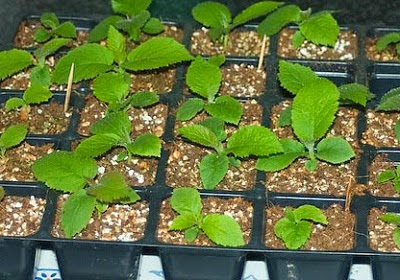Actinidia kolomikta is one of the most eye-catching of all hardy ornamental climbers. It is a slender species suitable for training along a sheltered wall, fence or old tree. It is grown for its attractive foliage and round white flowers which appear in June. Actinidia kolomikta is dioecious meaning that male flowers and female flowers are borne on separate plants. The heart-shaped leaves are marked to varying degrees with pink or white at the tips.
 |
| Actinidia kolomikta fruits - http://farm3.static.flickr.com/ |
Seed collected from the ripe fruit of female Actinidia kolomikta plants will need to be dried off for a couple of days before sowing, usually during October or November.
When ready, sow the seeds onto the surface of a large modular seed tray at a rate of one seed per module. Now give the seed a very light covering of compost or alternatively provide a thin layer of vermiculite. Gently water in. Self-collected seed can be placed in an unheated greenhouse for the winter where germination will occur in the spring. Place a sheet of glass or clear plastic on top of the tray to maintain humidity. Fridge stratified seeds should be sealed inside yet another polythene bag and place in a warm bright position such as a windowsill. Avoid a position which receives direct sunlight as this can cause the compost to dry out. Keep the compost moist and you can expect germination to occur in 2-3 weeks.
 |
| Actinidia kolomikta seedlings - http://forums.gardenweb.com/ |
Keep the compost moist and and grow them on in light shade in the greenhouse for at least their first winter. Come the spring of their second year, begin to harden the young plants off so that they are able to cope with outside conditions. Only do this so long as there are no frosts forecasted.
Actinidia kolomikta will perform best in a damp, humus rich, well-drained and slightly acidic soil. Place in a position that is sheltered from frosts but which also receives as much sunlight as possible. It will tolerate a partially shaded position but the leaf colouration will not be as strong.
For related articles click onto the following links:
HOW TO GROW ACTINIDIA CHINENSIS
HOW TO GROW ACTINIDIA KOLOMIKTA
TRACHELOSPERMUM JASMINOIDES
.jpg)







No comments:
Post a Comment